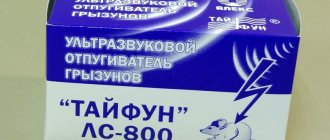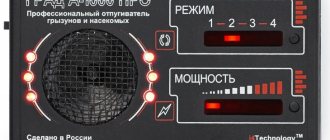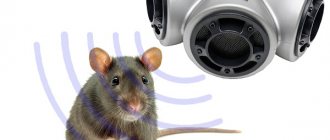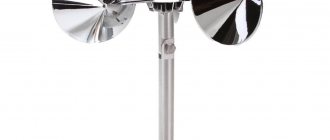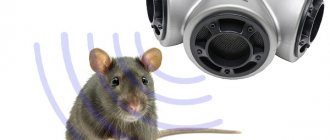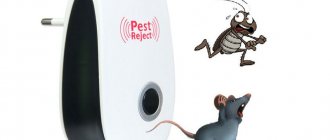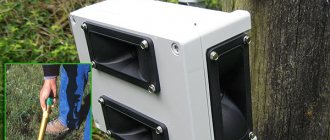Mice cause many problems to humans. Rodents destroy things, food supplies and carry diseases.
Previously, pests were controlled using poisons or simple traps. Now an innovative ultrasonic mouse repeller has appeared, acting through electromagnetic or ultrasonic radiation.
To find out how effective such devices are and how to use them, you should study the devices in detail. It is equally important to familiarize yourself with the opinions of experts and evaluate the advantages and disadvantages of ultrasonic traps.
Results of studies on the effectiveness of ultrasound against mice and rats
To understand whether ultrasound helps against mice, it is important to know what sound waves are and how they act on rodents. Ultrasound refers to sound vibrations with a frequency of more than 20,000 Hz.
This indicator is greater than the human hearing threshold. Therefore, many people do not detect ultrasound, but animals are able to perceive it.
A mouse can hear sound vibrations up to 100 kHz, and a rat can hear sound vibrations up to 40 kHz. It is noteworthy that rodents, using ultrasound, transmit various information to each other, for example, about help or danger.
This means that it is technically possible to make a device that emits sound waves that will repel mice. Presumably, pests will avoid those places where the repeller is located.
For the device to work effectively, it is important to select the correct frequency. The results of a number of studies have shown that rodents, when feeling pain, make sounds with a range of up to 28 kHz.
In the presence of a cat, mice produce oscillations of up to 33 kHz. If a rodent is scared, it squeaks at a level of almost 100 kHz.
Studies have also shown that repelling mice with ultrasonic waves in a narrow range is ineffective. Even when the repeller is initially effective, the pest subsequently gets used to the irritant.
In addition, ultrasound from rats may not be effective against small rodents, and vice versa. Therefore, effective repellers must operate according to the principle of random or constant frequency changes.
Only devices operating in this way will produce sounds that are unpleasant for mice. But such programs are used infrequently, which makes repellers ineffective.
Repellers are sought after by those who want to save money, and therefore they do not buy the best options.
This is a kind of psychological trap: you can remove rats either with your own hands and purchased products (which, at first glance, is cheaper), or by calling a pest control specialist, which seems to be a more expensive undertaking. And those who want to save money go to online stores and buy repellers, among other things, so as not to pay money to professionals. And trying to save money, they tend to buy not efficient devices for 3000-4000 rubles, but what is cheaper. And as we found out above, cheaper devices perform worse...
Typical Chinese repellers are bought according to the principle “let’s try, and if it doesn’t work, 400 rubles is not a pity”
In any case, our practice shows that removing rats yourself very rarely costs less than professional deratization . During the fight against rats, people spend more money on products than the cost of a specialist’s services, but they cannot always estimate these costs due to the fact that they buy such products at long intervals: one today, another in a month, and a third in six months. The total cost of such a struggle turns out to be significant, but “spread out” over time, which is psychologically perceived by a person more simply than a one-time payment for the services of a disinfectant. But in this case, you have to live with rats longer. And considering that sooner or later disinfectors still have to be called, the cost of exterminating rats turns out to be much greater than the cost of professional deratization alone.
Types of repellers
The modern market provides a considerable number of types of rodent repellers. Ultrasonic mouse traps have different methods of action, power, design, and cost.
Popular types of rodent repellers are ultrasonic, electromagnetic, and combined devices. All devices are considered effective. But in practice, the most effective are ultrasonic traps for the home.
Some people try to make a mouse repeller with their own hands. However, for this you need to have the skills of a radio amateur. Therefore, it is easier to purchase a ready-made trap.
Ultrasonic devices
Ultrasonic devices for repelling rats and mice are considered the most effective. This has been confirmed by a number of studies.
The trap emits waves of various frequencies at high volume. While the repeller is operating, mice nearby begin to experience discomfort and leave the room.
How the ultrasonic mouse repeller works is written in the instructions for the device. The trap automatically changes frequency.
It is noteworthy that waves are absorbed by soft materials, and hard ones are reflected. For the scarecrow to work best, it must be placed in an empty room.
Mouse repellers are installed almost everywhere:
- industrial enterprises;
- apartments;
- attics;
- offices;
- basements;
- warehouses;
- garages;
- residential buildings.
The advantages of ultrasonic repellers are uninterrupted operation, relative safety, and environmental friendliness.
Disadvantages include the impediment of waves through walls and reduced efficiency in a cluttered room.
Electromagnetic devices
Modern electromagnetic mouse repellers operate by emitting impulses transmitted through electrical wires in the area where one counter is located. Such devices negatively affect the nervous system of pests.
But when the electrical device starts operating, the number of mice may increase. This is explained by the fact that the waves penetrate into voids and ceilings, which are favorite places for harmful animals. Experiencing discomfort, rodents leave their homes and begin to look for a way out.
Mains powered repellers are considered more powerful. Therefore, experts do not recommend choosing models that operate on batteries.
Advantages of electromagnetic traps:
- environmental friendliness;
- continuous operation;
- wide area of influence;
- safety.
Electromagnetic repellers do not change the operation of other mains-powered devices. The main advantage is that traps help get rid of mice hiding in walls and ceilings.
The disadvantage of electromagnetic repellers is that for the device to function properly, the wiring must be located along the length of the entire room.
Combined instruments
The combined repeller combines electric and ultrasonic methods of influencing mice and rats. As an additional effect, universal devices emit light signals.
Pests get used to one type of waves, and changing their type and frequency prevents this. Thus, a combined repeller is considered the best means for repelling mice.
Advantages of a multifunctional trap:
- quick effect;
- versatility;
- action in any type of premises;
- safety.
In order for the device to function properly and at high power, it is better to choose an ultrasonic mouse repeller that is not battery-powered, but one that runs on batteries.
The only drawback of the device is its high cost. But high efficiency, fast and extensive action make this minus insignificant.
Video
Ultrasonic rodent repeller (mice and rats) Electrokot Classic
List of the best devices
There are a lot of effective devices that drive out rodents. The most effective mouse and rat repeller is Grad A-1000 PRO+. It has a considerable number of positive reviews.
The trap operates at any temperature (-35...+75 degrees). The radius of influence of the repeller is up to 1000 m2. The device can be adjusted by choosing a frequency to influence a specific type of pest.
The repeller works from the mains. It can also be connected to a car battery.
In second place, according to expert reviews, is Chiston-2 PRO. The device emits waves in bursts, which significantly increases the performance of the device.
But the area of influence of this repeller is smaller than that of the leader. Its radius of action is 500 m2.
The propagation angle of the trap signal is 360 degrees.
Users note other advantages of the mouse repeller:
- high power,
- safety,
- wide temperature range.
The only negative is the inability to carry the device, since it runs on mains power.
The third position is occupied by Typhoon OG.O1. The wave propagation latitude is 220 m2. The range of ultrasonic radiation ranges from 19-70 kHz.
Mice disappear after 2-4 days of regular use of the repeller. The device can be placed not only on the floor, but also attached to a wall or ceiling.
Typhoon can withstand temperature changes within -15...+45 degrees. The repeller is quite compact and economical. The disadvantages of the device are that it is powered from the mains and has a short cord.
Rating of rat or mouse repellers:
| Nomination | Name | Place | Cost in rubles |
| The best devices that act exclusively on rodents | Tornado 400 | 1 | 2100 |
| Electric cat | 2 | 1300 | |
| Electromagnetic devices | EMR-21 | 1100 | |
| RIDDEX PLUS | 650 | ||
| Hawk 200 | 1500 | ||
| Digital | 600 | ||
| Universal repellers | WEITECH WK-0600 | 6000 | |
| ECOSNIPER LS-927M | 1700 | ||
| MONGOOSE SD-042 | 1800 | ||
| REXANT 71-0009 | 800 |
"Typhoon"
“Typhoon” is not even one device, but a whole series of them. Each device has its own parameters. The cost of the repeller depends on the area of wave propagation. On average, a Typhoon can be purchased for 800 rubles. Some models are more expensive - their price reaches 1600 rubles.
Main characteristics:
- the area over which the waves spread is up to 220 meters;
- Thanks to the fastening, it can be attached to the wall;
- can work not only from the mains, but also from a car battery.
- sound is emitted in a wide beam.
The electronic device operates in two modes: sound and silent. The first is more powerful, as a rule, it is used in industry or in warehouses. The silent one also gives results in a private home.
“Typhoon” is easy to use, it’s easy to assemble, all you have to do is plug it into the network. At first it will emit a loud signal, then go into wave generation mode. In just four days, the mice will leave your premises.
"Typhoon"
How to choose the right device
For ultrasound to be effective against mice, it is important to be able to select the device correctly. The first parameter that requires attention is power. This indicator determines the range of the device.
Other rules for choosing a repeller:
- sound pressure. The efficiency depends on the height of the parameter. The best indicators are from 110 dB.
- Operating frequency. The optimal parameter is 20 kHz.
- Distribution area. The radiation range of modern devices is 400-1000 m2.
- Type of power supply. It is recommended to choose traps that operate on electricity. These are more effective, powerful repellers for rats and mice. They also have a larger impact area.
Operating conditions for the device
Ultrasonic mouse and rat repellers will only function well if you provide the right conditions for their operation. There are a number of requirements for the room where the device will be located and for the device itself.
Thus, it is advisable to install repellent devices away from household appliances in uncluttered rooms.
The device itself must emit different frequencies, and its area of influence must be larger than the parameters of the room.
Requirements for the place of use
Sound waves have certain properties. Therefore, when using a mouse scarer, it is important to comply with a number of requirements.
Ultrasonic waves are absorbed by soft surfaces and repelled by hard ones. In view of this, if there is a stone wall in the room, the sound will not travel further. If there is a large accumulation of soft things in the room, the effect of vibrations will be minimal.
In a room with thick, hard walls, the waves will be reflected inward, increasing their impact. But the use of a repeller will be advisable only for this room, because the sound will not penetrate into other rooms.
Traps are not recommended to be installed in crowded rooms. For example, in warehouses where things or grain are stored. After all, the sound will be absorbed, which will allow the mice to avoid it.
For the repellent device to function well, it must be placed correctly. It is advisable to install the device in the center of the room, which will allow the waves to diverge in all directions.
An important condition is the absence of food or other bait in the room. This will attract mice that even the ultrasound will not stop.
Requirements for the device itself
In order for a device that repels mice and rats to function well, it must meet certain parameters. A prerequisite is a constant change in the wave frequency. Moreover, the wider their range, the stronger the effect will be.
Other requirements for mouse repellers:
- the range of influence of the trap must correspond to the area of the room.
- Force pressure of at least 100 dB.
- Ultrasound should be emitted from the device at 360 degrees.
To find out whether the repeller meets these parameters, before purchasing it, you should carefully study the instructions for using the trap.
The effect of ultrasound on pests
The mouse repeller works by emitting ultrasonic waves with a frequency of up to 20,000 Hz. These sounds are not audible to humans, but they are felt by rodents, who are more susceptible.
Scientists who have conducted a lot of experiments know how ultrasound works on mice. High frequencies negatively affect the nervous system of parasites.
Under the influence of the repeller, animals develop a feeling of danger and fear. Therefore, pests flee. But after a while, mice can return, which requires regular use of the device.
Rats are either not afraid of the repeller initially, or over time they get used to it
Both scientists and practical disinfectors know that rats quickly get used to even scary and frightening sounds, electromagnetic radiation and ultrasounds. If they eventually realize that the sound is not associated with any real danger, they stop paying attention to it and return to their normal activities.
This can explain those cases in which, after turning on the repeller, rats temporarily reduced their activity and then resumed normal life.
Even experiments show that near powerful repellers, rats first begin to behave cautiously, and then “loose their belts” again.
Plus, you need to take into account that the more people use this or that repeller, the more rats manage to get acquainted with it and get used to it. Accordingly, the cheaper, more accessible and more advertised the product, the worse it will work. And vice versa - the better repeller is the one that costs more and is not sold at every market stall.
